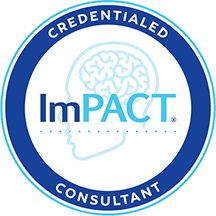A concussion is a form of traumatic brain injury and can be the result of a blow to the head or body. The impact of the blow can rapidly move the head, stretching the brain and injuring the cells within the brain.
Concussion management has changed over the years along with our knowledge and understanding of concussions. Our treatment of concussions has changed too. The most important factor being the awareness that each case of a concussion is different and the treatment should be individualized to the patient.
Dr. Sussman is board certified in sports medicine and has additional training in concussion assessment and management. He is a certified ImPACT consultant, the only FDA (Federal Drug Administration) cleared aid in the assessment and management of concussion. For more on why to see a concussion specialist here.
You do not have to lose consciousness to have a concussion. In fact,
most concussions occur without loss of consciousness. Signs and symptoms
of concussion do not always show up right after an injury, and
sometimes symptoms may not be noticed until hours or days after the
injury.
Concussions can cause a range of signs and symptoms. If
an athlete reports one or more symptom of concussion, he/she should be
evaluated by a health care professional. The athlete should not be
allowed to return to play until the possibility of a concussion has been
ruled out.
Physical
Cognitive
Emotional
Sleep
Recovery time varies case by case. Young children and teens are more likely to get a concussion and take longer to recover than adults.
While recovering, the athlete should not be allowed to return to play until cleared by a health care professional experienced in evaluating for concussions. If the athlete has not fully healed from the first concussion, a second blow to the head can delay recovery and cause second impact syndrome. Second impact syndrome is a potential complication of returning too early and can result in catastrophic injury.
In Massachusetts, every child who has suffered a concussion must be cleared by a physician or health care professional before returning to play.
Concussions cannot be diagnosed with imaging, CT scans or MRIs. Doctors often rely on patients reporting symptoms when diagnosing a concussion. In addition to a physical examination, Dr Sussman offers ImPACT testing.
ImPACT is a test that can be used to evaluate a concussed athlete after an injury. ImPACT testing can also track recovery and help determine when it is safe for an athlete to return to his/her sport.

The ImPACT test is a 20-minute computerized neurocognitive assessment. The athlete completes a number of tasks that test memory and reaction speed. ImPACT testing is the only FDA-cleared aid to help in the assessment and management of concussion.
Typically, athletes will take the test at the beginning of the season, before a concussion. This is called the baseline test, and any results from the ImPACT tests taken after a concussion can be compared to these baseline results. This helps determine when the brain has fully recovered and when it is safe to return to the sport.
Baseline and post-concussion ImPACT testing is offered by Dr. Sussman. If you are interested in baseline testing or have had a concussion, please call our office to schedule a consultation.